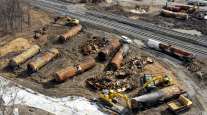Senior Reporter
Congressional Policymakers Propose Infrastructure Resilience Review Board

[Stay on top of transportation news: Get TTNews in your inbox.]
A seven-member independent board would recommend ways local governments could strengthen their resilience to severe weather events as part of legislation congressional policymakers unveiled this month.
Under the Disaster Learning and Life Saving Act, introduced by Sen. Bill Cassidy (R-La.) in the Senate and Rep. Garret Graves (R-La.) in the U.S. House, a permanent, independent board would be established to examine the reason for severe and extreme weather events that cause fatalities and property damage.
After an evaluation of freight and commuter corridors, as well as weather patterns, this National Disaster Safety Board would issue recommendations to local, state and federal government agencies on strategies for improving a community’s resilience to such weather events. The severe and extreme weather or climate events would not be limited to hurricanes, floods and wildfires.
National Disaster Safety Board by Transport Topics
Specifically, the board would seek input from federal, state and local officials, as well as research institutions. At least two of the board’s seven members would come from state and local agencies.
Officials from communities under the board’s review would be able to offer feedback on the board’s reports and recommendations. The board, which would have no regulatory authority, would aim to undergo fact-finding projects, as well as offer technical assistance to agencies.
The Government Accountability Office would be tasked with evaluating the board’s methodology.
The board would be modeled after the independent National Transportation Safety Board, which produces reports after investigating plane crashes, and major commercial highway and railroad accidents.
“Americans across the country from the Gulf Coast to California are dealing with the results of natural disasters. Another hurricane is zeroing in on Louisiana right now. By establishing a natural disaster safety board, lessons learned from past disasters save lives and perhaps even prevent future disasters,” said Cassidy Oct. 9.
“The National Transportation Safety Board has saved countless lives by carefully examining the causes of transportation accidents and identifying life-saving safety improvements to airplanes, trains, pipelines and vessels. There is no question that we continue to repeat the same two mistakes when it comes to natural disasters — preparation and response. As a result, thousands of American lives and hundreds of billions of dollars have needlessly been lost,” said Graves, ranking member of the Aviation Subcommittee.
“The National Disaster Safety Board will examine the causes of disasters and help to build upon some of our recent solutions to improve America’s preparedness and resilience. Based upon our recent disasters in Louisiana, I can give you one solution already — export the Cajun Navy to the other 49 states,” Graves continued.
Co-sponsors include Sen. Brian Schatz (D-Hawaii) and Rep. Katie Porter (D-Calif.).
Access to comprehensive, science-based research is crucial for lawmakers to make informed decisions about disaster-preparedness. Today, I introduced a bill with @RepGarretGraves that would make it easier for policymakers at every level get this data ⬇️https://t.co/G48acOZOf7 — Rep. Katie Porter (@RepKatiePorter) October 9, 2020
“Orange County families have seen an uptick in the number and severity of natural disasters, so we know how important it is to have comprehensive research to make science-based policy,” said Porter.
“Our bill creates a new independent board to investigate major natural disasters and gives policymakers and the public a full accounting of what happened and what should happen next,” added Schatz.
Groups representing various interests have endorsed the legislation. They include the Natural Resources Defense Council, the Bipartisan Policy Center’s advocacy arm, and the American Society of Civil Engineers.
ASCE observed: “The [board] would be independent. Its seven members will be chosen for their experience in emergency management, public health, engineering, social and behavioral sciences, and experience working at the state and local level and with vulnerable communities. The goal would be to offer policymakers a path forward to build more resilient communities. A major tenet of the bill would be technical assistance to support jurisdictions implementing its resiliency recommendations.”
The legislation was referred to committees of jurisdiction.
Want more news? Listen to today's daily briefing:
Subscribe: Apple Podcasts | Spotify | Amazon Alexa | Google Assistant | More




